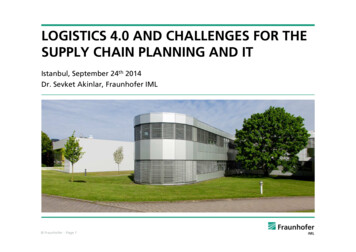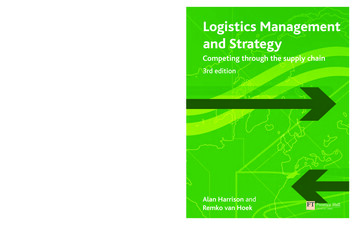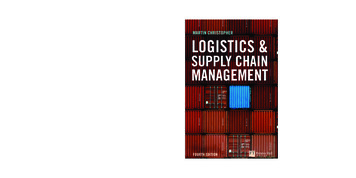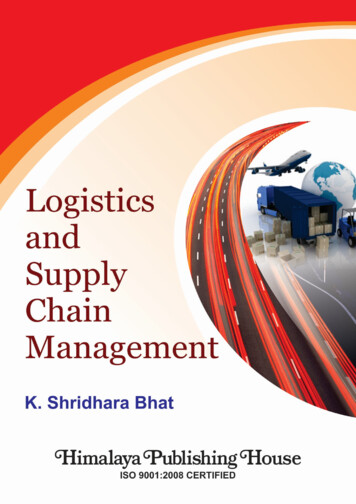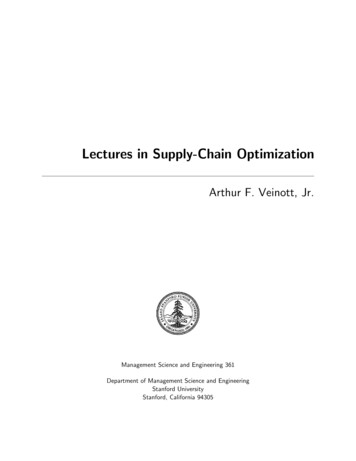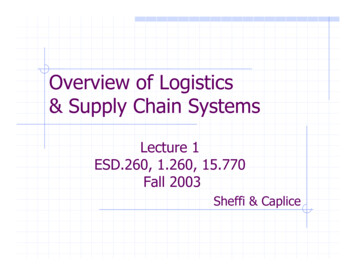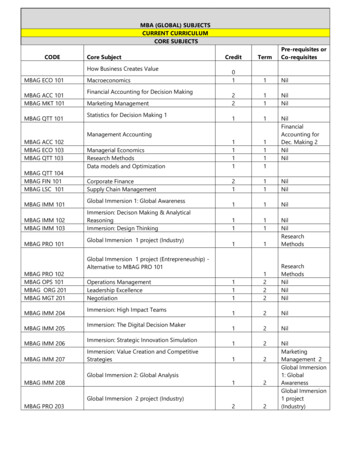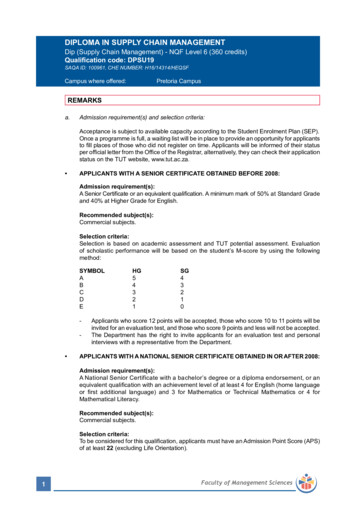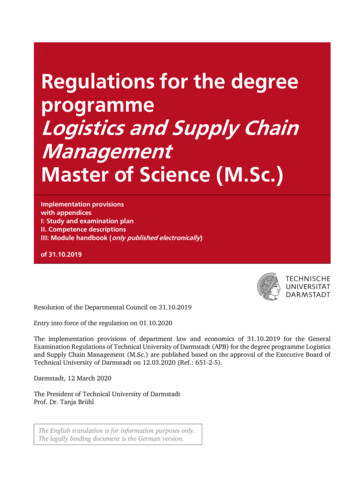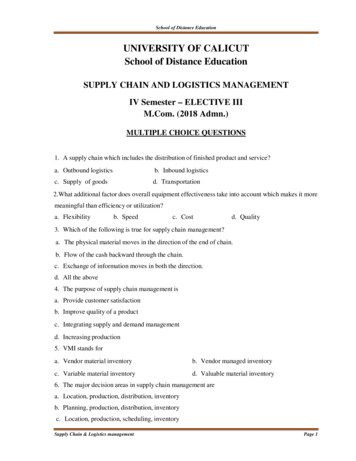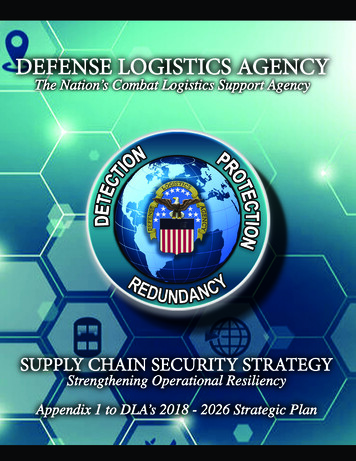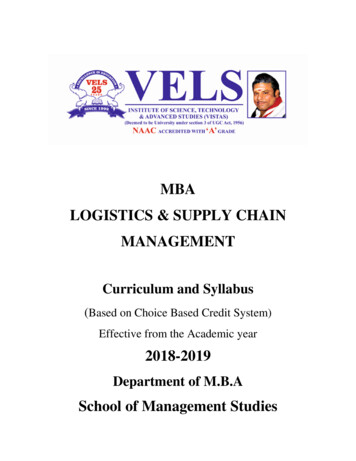
Transcription
MBALOGISTICS & SUPPLY CHAINMANAGEMENTCurriculum and Syllabus(Based on Choice Based Credit System)Effective from the Academic year2018-2019Department of M.B.ASchool of Management Studies
MBA LOGISTICS & SUPPLYCHAIN MANAGEMENT
VISTAS MBA Program OutcomesThe following outcomes have been identified by the School of Management and commerce,Faculty Council, as important for students to be able to perform at the conclusion of the MBAprogram. The MBA curriculum has been mapped to these outcomes, which are regularlyassessed to identify levels of student achievement and areas of improvement. Students who areGraduates of the Master of Business Administration degree program will be able to:1. Apply knowledge of management techniques in business environment2. Evaluate the systems and processes used in an organization including the planning, decisionmaking, group dynamics, innovation, production, supply chain, operations, technologies,marketing and distribution management.3. Design alternatives to solve business problems utilizing quantitative analysis, critical thinkingand sound ethical decision making.4. Use research based knowledge and methods including company analysis, primary andsecondary data collection, analysis and interpretation of data to find solution to businessproblems5. Demonstrate effectively on analysing, interpreting and solving problems in developingbusiness projects using appropriate tools and techniques.6. Apply economic models, accounting principles, statistical techniques, and financial theories,analysis, and reporting in business decision-making.7. Organize tools and techniques from Various Functional areas(i.e Finance , Marketing, HumanResources, operations etc) to handle business problems.8. Evaluate and combine ethical considerations in making business decisions9. Communicate effectively in various forms by effective use of recent technology and logicalreasoning for presentations, documentation, report writing ,manual preparation .10. Adapt life-long learning and professional development to enrich knowledge andcompetencies11. Perceive an aptitude for creativity, innovation and entrepreneurship.12. Demonstrate a global outlook with ability to identify aspects of the global businessoperations.
MBALOGISTICS & SUPPLY CHAIN MANAGEMENTProgram Specific OutcomesPSO – 1: Apply fundamental knowledge of management that comprising of accounting, finance,marketing and human resources management with supply chain for a supply chain enterprise.PSO – 2:Apply fundamental knowledge of management that comprising of accounting,finance, marketing and human resources management with logistics for a business enterprise.PSO – 3:Demonstrate knowledge, skills and techniques of operations that comprising ofproject and quantitative method to improve supply chain and logistics operations.PSO – 4:Apply the fundamental concepts of transportation and distribution managementrelated to national and international business system.PSO – 5: Organize the implementation of logistics strategies and manage logistics resources toimprove supply chain operations.PSO – 6: Identify the concepts of planning and strategy to improve logistics and supply chainsystem operations.PSO – 7: Discover the drivers of logistics and supply chain system to improve the businessperformance.PSO – 8: Improve the supply chain process using the advanced operations such as quality, lean,strategy and green to ensure sustainable business practices.PSO – 9: Improve the logistics process using the advanced operations such as quality, lean,strategy and green to ensure sustainable business practices.PSO – 10: Develop analytical skills using Information technology to implement the concepts oflogistics and supply chain system to aid decision making.PSO – 11: Communicate effectively in various firms by effective use of recent technology andlogical reasoning for presentation, documentation, report writing and manual preparationPSO – 12: Adapt to changing the demands due to advancements in Information Technology inlogistics and supply chain industry.
VISTASSCHOOL OF MANAGEMENT STUDIESBOARD OF STUDIES MEMBERSMBA (GEN), MBA (LSM), MBA (LSCM) and MBA (BA)Sl.No1.2.3.4.5.6.7.8.9.10.Name & AddressDr.P.R. Ramakrishnan,Dean, School of Management Studies,VISTAS, Chennai-600117Dr.R.Thenmozhi,Professor and Head,Department of Management Studies,Madras University, ChennaiMr.K.V.V.GiriPresident CCHA,M/S Vaishnavi freight logistics Pvt ltd.Mrs.Sripriya,Operations Programme Manager, TCSDr.S.Vasantha ,Professor, School of Management e Professor,School of Management Studies,VISTAS,Chennai-600117Dr.G.RajiniAssociate Professor,School of Management Studies,VISTAS,Chennai-600117Dr.P.ShaliniAssociate Professor, School of Management stant Professor, School of Management Studies,VISTAS,Chennai-600117Dr. A. Mohammed FaisalAssistant Professor, School of Management nExternal ExpertExternal ExpertAlumniInternal MemberInternal MemberInternal MemberInternal MemberInternal MemberInternal Member
VISTASDEGREE OF MASTER OF BUSINESS ADMINISTRATIONMBALOGISTICS & SUPPLY CHAIN MANAGEMENTCHOICE BASED CREDIT SYSTEMREGULATIONSw.e.f. 20181. ELIGIBILITY FOR THE AWARD OF DEGREE:A candidate shall be eligible for the award of the Degree only if he/she has satisfactorilyundergone the prescribed Course of Study in a College affiliated to this University for a period ofnot less than TWO academic years and, passed the examinations of all the FOUR Semesters.2. DURATION OF THE COURSE:The course for FULL-TIME students shall extend over a period of TWO academic yearsconsisting of FOUR Semesters. Each academic year shall be divided into Two Semesters. TheFIRST academic year shall comprise the First & Second Semesters, the SECOND academic yearthe Third & Fourth Semesters.The ODD Semesters shall consist of the period from July to November of each yearandthe EVEN Semesters from January to April of each year.The duration of each semester will be about 16 weeks. The subjects of study shall be inaccordance with the syllabus prescribed from time to time which may be amended through aboard of studies members.CONDITIONS FOR ADMISSION:Candidates shall be required to have passed any Bachelor's Degree of anyUniversity/Institute of college or of any other University or a qualification accepted by theSyndicate of this University as equivalent thereto, shall be eligible for admission to MBA DegreeCourse.
3.1. COURSE OF STUDY AND SCHEME OF EXAMINATIONS (FULL TIME)The total number of subjects of study shall be 25 out of which 17 shall be compulsorysubjects and of the remaining 8 will be Electives, Internship after Second semester and ProjectWork in the Final Semester with a Viva-voce.The FULL-TIME candidates shall take 8 subjects (Theory) in the First semester, 8subjects (Theory) in the Second Semester, 9 subjects (Theory) in the Third Semester and aSummer Internship and a Project Work.3.2. ELECTIVE SUBJECTS:To offer Elective Subjects to the students, a Minimum enrolment in the Elective Subjectsshall be TEN.PROJECT REPORT & VIVA VOCE:The Project Report must be submitted through the Supervisor and the Head of theDepartment at the end of the final semester ie following the third semester Examination failingwhich the candidate will be treated as appearing on a second occasion and shall NOT BEELIGIBLE for First Class and Ranking.MBA – LSCMSEMESTER ICodeHour / WeekCourseCreditsLecture Tutorial 8CMBS1618CMBS1718PMBS11Management Principles andOrganizational BehaviourBusiness Statistics & QuantitativeTechniquesManagerial EconomicsFinancial Reporting, Statements &AnalysisLegal & Business EnvironmentBusiness CommunicationComputer Applications for BusinessCommunity Development Project /40044004400431044440000000024441
MOOC / Outbound ExperentialLearning Programme271229SEMESTER IICodeHour / WeekCourse18CMBS2118CMBS2218CMBS2318CMBS .18CMBS .18CMBS .18CMBS .Human Resources ManagementMarketing ManagementOperations ManagementElective IElective IIElective IIIElective al Practical0000000000000000004444443276SEMESTER IIICode18CMBS3118CMBS3218EMBS .18EMBS .18EMBS .18EMBS .18EMBS .18EMBS .Hour / WeekCourseEnterprise Resource PlanningResearch MethodologyElective VElective VIElective VIIElective VIIIElective IXElective XSEMESTER IVLecture Tutorial 3326
CodeCourse18RMBS41Hour / WeekLecture Tutorial Practical00280028ProjectCredits1414Total Credits: 102Internship: The students have to undergo an Internship for thirty days in between secondand third semester. The maximum marks for Internship will be 100. The Internship will beevaluated through Viva voce Exam by the guide and an External expert.Project: The students will do a Project work for Four months in the Fourth Semester.The Maximum marks for Project Work will be 300. The project Work will be evaluated throughViva voce Exam by the guide and an External expert. The components of Project Work will be100 marks for Dissertation and 200marks for Viva voce.ELECTIVE COURSES – II SEMESTERFUNCTIONALAREASupply MBS30Supply Chain Information SystemSupply Chain Concepts & PlanningGlobal SCMVendor Managed InventorySCM for Services MarketingLogistics Concepts & PlanningTransportation & Distribution ManagementAir Cargo ManagementMultimodal Transportation ManagementInland Waterways Management
ELECTIVE COURSES – III SEMESTERFUNCTIONALAREALogistics &Supply 5018EMBS51International LogisticsPurchasing and Strategic SourcingWarehousing and Distribution Facilities ManagementContract Logistics and Closed Loop Supply chainsLogistics & Supply Chain Performance ManagementGreen Supply Chain ManagementSupply Chain AnalyticsSourcing ManagementLean Six SigmaProject ManagementOperations Research ApplicationsTotal Quality ManagementWorld Class ManufacturingBehavioural Operations ManagementManagement of Manufacturing SystemsOperations StrategyServices Operations ManagementEnvironmental StudiesIndian Ethos and Business EthicsBusiness Policy & StrategyE-Business4. REQUIREMENTS FOR PROCEEDING TO SUBSEQUENT SEMESTER:a. Candidates shall register their names for the First Semester Examination after theadmission in PG Courses.b. Candidates shall be permitted to proceed from, the First Semester up to Final Semesterirrespective of their failure in any of the Semester Examination subject to the condition thatthe candidates should register for all the arrears subjects of earlier semester along withcurrent (subsequent) Semester subjects.c. Students appearing for the University examinations must have a minimum of 75%attendance, failing which will not be permitted to write the examinations.d. However, the University may condone he attendance shortage of 10% after collecting acondonation fee from the students who have secured 65 to 74% of attendance.
e. The students who have secured less than 65% attendance are not eligible to write therespective semester examination. He / She has to rejoin and re-do the respective semestercourse in the next academic year by paying the prescribed tuition fee.f. Condonation for deficiency of attendance will not be granted as a matter of routine.5. EXAMINATIONS:There shall be four examinations, first semester examination will be held in Nov/Dec ofthe first year and the second semester examination at April/May of the first year. Similarly thethird and fourth semester examinations will be held during Nov/Dec and April/May of thesecond year respectively. Max. no. of attempts is 8.6. PASSING MINIMUM:i.A candidate who secures not less than 50 percent marks in the External WrittenExamination and the aggregate (i.e. Written Examination Marks and the InternalAssessment Marks put together) respectively of each paper shall be declared to havepassed the examination in that subject.ii.a. A candidate shall be declared to have passed Project Work and Viva-Vocerespectively, if he/she secures a minimum 50 percent marks in the Project WorkEvaluation and the Viva Voce respectively.b. A candidate failing in any subject will be permitted to appear for the examinationsagain on a subsequent occasion without putting in any additional attendance.c. A candidate who fails in either Project Work or Viva-Voce shall be permitted toredo the Project Work for evaluation and reappear for the Viva-Voce on a subsequentoccasion, if so recommended by the Examiners.iii.A Candidate who successfully completes the course and passes the examinations of allthe FOUR Semesters prescribed as per Scheme of Examinations earning prescribedCREDITS shall be declared to have qualified for the Degree, provided the whole coursehas been completed within a maximum of 4 YEARS from the date of initially joining thecourse in the case of a FULL-TIME candidates.
7. CLASSIFICATION OF SUCCESSFUL CANDIDATES:Successful candidates securing not less than 60 percent in the aggregate of the marksprescribed for the Course shall be declared to have qualified for the Degree in First Class,provided they have passed the Project Work and the Viva-Voce at the FIRST appearance and theExamination of all the other subjects within TWO YEARS after their admission in the case ofFULL-TIME students.Successful candidates securing not less than 75 percent in the aggregate of the marksprescribed for the Course shall be declared to have qualified for the Degree in First Class withDistinction provided they pass all the examinations prescribed for the course at the FirstAppearance / instance.All other successful candidates shall be declared to have passedreexamination in the Second Class.8. GRADING SYSTEMThe following table gives the marks, grade points, letter grades and classification toindicate the performance of the candidate.Conversion of Marks to Grade Points and Letter Grade(Performance in a Paper /Course)MarksGrade PointsGradeDescription90-10010OOUTSTANDING85-899A EXCELLENT80-848AVERY GOOD75-797.5B GOOD70-747BABOVE AVERAGE60-696CAVERAGE50-595DMINIMUM FOR PASS00 - 490RAREAPPEARAAAABSENT-
Calculation of GPA & CGPAGPA (C X GP) / (C)CGPA in 1 (Ci X GPi) / in 1(Ci)n Number of subjectsC Credit for the academic courses successfully completedGP Grade point for the courses successfully completedGPA Grade point average for all the courses successfully completed in thecurrent semester examinationCGPA Cumulative grade point averageOverall Performance:CGPAGradeClass5.00 - 5.99DSecond Class6.00 - 6.99C7.00 - 7.49B7.50 - 7.99B 8.00 - 8.49A8.50 - 8.99A 9.00 - 10.0OFirst ClassFirst Class with DistinctionFirst Class - Outstanding*The candidates who have passed in the first appearance and within the prescribed semester ofthe PG Programme (Core, Elective, Non-major Electives and Extra-Disciplinary courses alone)are eligible.9. RANKING:Candidateswhopassalltheexaminations prescribedfortheCourseIn the FIRST APPEARANCE ITSELF ALONE are eligible for Ranking/Distinction provided inthe case of Candidates who pass all the examinations prescribed for the Course with a break in theFirst Appearance due to the reasons as furnished in the Regulations under REQUIREMENTSFOR PROCEEDING TO SUBSEQUENT SEMESTER are only eligible for Classification.
10. QUESTION PAPER PATTERNTotal Marks for each subject 100 MarksUniversity Exam 60 MarksInternal Assessment 40 MarksDuration: 3 Hours Max. Marks: 100Part A : 8 out of 10 questions( 8 X 5 40 )Part B : 4out of 6 questions( 4 X 10 40 )Part C :1 Case Study or Problem is Compulsory ( 1 X 20 20 )
MBA – LSCMSEMESTER S1618CMBS1718PMBS11Hour / WeekCourseLecture Tutorial PracticalManagement Principles andOrganizational BehaviourBusiness Statistics & QuantitativeTechniquesManagerial EconomicsFinancial Reporting, Statements &AnalysisLegal & Business EnvironmentBusiness CommunicationComputer Applications for BusinessCommunity Development Project /MOOC / Outbound ExperentialLearning 1229SEMESTER IICodeHour / WeekCourse18CMBS2118CMBS2218CMBS2318CMBS .18CMBS .18CMBS .18CMBS .Human Resources ManagementMarketing ManagementOperations ManagementElective IElective IIElective IIIElective al Practical0000000000000000004444443276
SEMESTER IIICodeHour / WeekCourse18CMBS3118CMBS3218EMBS .18EMBS .18EMBS .18EMBS .18EMBS .18EMBS .Enterprise Resource PlanningResearch MethodologyElective VElective VIElective VIIElective VIIIElective IXElective XLecture Tutorial 3326SEMESTER IVCodeCourse18RMBS41ProjectHour / WeekLecture Tutorial Practical00280028Credits1414Total Credits: 102ELECTIVE COURSES – II SEMESTERFUNCTIONALAREASupply MBS30Supply Chain Information SystemSupply Chain Concepts & PlanningGlobal SCMVendor Managed InventorySCM for Services MarketingLogistics Concepts & PlanningTransportation & Distribution ManagementAir Cargo ManagementMultimodal Transportation ManagementInland Waterways Management
ELECTIVE COURSES – III SEMESTERFUNCTIONALAREALogistics &Supply 5018EMBS51International LogisticsPurchasing and Strategic SourcingWarehousing and Distribution Facilities ManagementContract Logistics and Closed Loop Supply chainsLogistics & Supply Chain Performance ManagementGreen Supply Chain ManagementSupply Chain AnalyticsSourcing ManagementLean Six SigmaProject ManagementOperations Research ApplicationsTotal Quality ManagementWorld Class ManufacturingBehavioural Operations ManagementManagement of Manufacturing SystemsOperations StrategyServices Operations ManagementEnvironmental StudiesIndian Ethos and Business EthicsBusiness Policy & StrategyE-Business
SEMESTER I
18CMBS11MANAGEMENT PRINCIPLES AND ORGANIZATIONALBEHAVIOUR4004COURSE OBJECTIVE: To describe the fundamentals of Management, significance, scope of management, levels ofmanager, functions of a manger and basics of organizational behavior. To discuss the development of management thought To examine and analyze the behavior of individuals and groups in organizations byunderstanding the concepts of learning, attitudes & perceptions. To understand about the organizational structure, its types, decentralization and delegationof the authority.COURSE OUTCOMES:At the end of the course, the students will be able to:CO – 1: Discuss about the management and its historical development.CO – 2: Assess the fundamentals of organizational behavior and OB Model.CO – 3: Analyze the behavior of individuals and groups in organizationsCO – 4: Summarize the perceptions, learning, attitudes, and motivation in organizationsCO – 5: Analyze the teams and organizations, evaluating transaction analysis.CO – 6: Compare and contrast power and influence of leadershipCO – 7: Assess the knowledge about the organization structure and its typesCO – 8: Describe about the line and staff authority.CO – 9: Demonstrate the dynamics of organizational change.CO – 10: Identify the major issues in business ethics and corporate social responsibility.UNIT IINTRODUCTION TO MANAGEMENT12Introduction to Management and Organizational Behavior: Concept of Management, ApplyingManagement theory in practice, Evolution of management thought, Management process andFunctions – Managerial Roles – OB Model – Contributing disciplines of OB – MBOUNIT IIINDIVIDUAL PROCESS IN ORGANIZATIONS12Individual Processes in Organizations: Foundations for Individual Behavior – Learning - Attitudes
and Job satisfaction – Personality and values – Perception - Motivation and Organizationalperformance. Contemporary theories of motivation.UNIT IIIINTERPERSONAL PROCESS IN ORGANIZATIONS12Interpersonal process in Organizations: -Communication Process -Methods – Barriers -Grapevine.Transactional Analysis. Group Dynamics: Typology of Groups -Conflicts in groups - LeadershipModels and Concepts – leadership theories – Decision making and negotiation - Power and Politics.UNIT IVORGANISATIONAL PROCESS12Organizational Process and Characteristics: Dimensions of Organization structure – Authority,Responsibility, and Accountability – Delegation – Centralization, Decentralization – Line and StaffRelationship.UNIT VORGANIZATIONAL DEVELOPMENT12Organizational Development: Resistance to Change - Organizational change - Organizationaldevelopment – Stress management – Business ethics and corporate social Responsibility.TOTAL: 60 HOURSTEXT BOOKS:1. Harold Koontz & Heinz Weihrich, “Essentials of Management”, TMH, 10th Edition, 2007.REFERENCE BOOKS:1. Michael A. Hitt, J. Stewart Black, and Lyman W. Porter, Management, Pearson, 11thEdition, 2011.2. Koontz &Weirich, Essentials of Management, Tata McGraw Hill Publishing Company,New Delhi. Stoner, Freeman & Gilbert, Management, PHI, 6th Edition.3. Robbins.S.P. Fundamentals of Management, Pearson, 2003. Robbins.S. OrganisationalBehaviour, X edn., Prentice-Hall, India.
BUSINESS STATISTICS & QUANTITATIVE18CMBS12TECHNIQUES4004COURSE OBJECTIVE: To acquaint the student with the applications of Statistics and Operations Research tobusiness and industry To help them to grasp the significance of analytical techniques in decision making. To test on the application of Operations Research to business related problems.COURSE OUTCOMES:At the end of the course, the students will be able to:CO – 1: Formulation a Linear programming problem.CO – 2: Solve the formulation of Linear programming.CO – 3: Evaluate the initial solution for Transportation Model.CO – 4: Evaluate the solution for Assignment Problem.CO – 5: Minimize the waiting hours of simultaneous projects undertaken.CO – 6: Explain the different network models.CO – 7: Evaluate the solution for game theory.CO – 8: Solve the game theory using dominance.CO – 9: Understand the descriptive statistics and probability.CO – 10: Apply the statistical techniques in reality to market scenario.UNIT ILINEAR PROGRAMMING12Operations Research – Linear programming (LP) – Formulation – Graphical Solutions – SimplexMethod – Duality Concepts – Sensitivity Analysis – Using Excel solver to solve LP ProblemsUNIT IITRANSPORTATION AND ASSIGNMENT12Transportation Model – Initial Solution: North West Corner Rule, Least Cost Method, Vogel’sApproximation method – Assignment Problem.UNIT IIINETWORK MODELS12Network Models – Shortest Path Problem: PERT & CPM – Maximum Flow Problem – MinimumSpanning TreeUNIT IVGAME THEORY12Game Theory – Game – Zero-sum games and Non-zero sum games – Pure & Mixed Strategy –
Maximin–Minimax Principle – Dominance Property.UNIT VSTATISTICS12Introduction – Descriptive Statistics – Hypothesis Testing – T-test – Analysis of Variance –LinearRegression.TOTAL: 60 HOURSTEXT BOOKS:2. Tulsian, P. C., Vishal Pandey, Quantitative Techniques – Theory and Problems, PearsonPublications, 2006.3. Sankar P. Iyer, Operations Research, Tata McGraw-Hill Education, 2008REFERENCE BOOKS:4. Hamdy A. Taha, Operations Research-An introduction, Pearson Education, 8th Edition /Prentice Hall of India, 2007.5. A. Ravindren, Don T. Phillips and James J. Solberg, Operations Research Principles andPractice, John Wiley and Sons, 2nd edition, 2000.
18CMBS13MANAGERIAL ECONOMICS4004COURSE OBJECTIVE: The study the concept of Managerial Economics by applying a series of basic economicsprinciples. To gain knowledge on issues related to optimal pricing strategies, demand forecasting, andoptimal financing, appropriate hiring decisions, and investment decisions, among others,can be successfully tackled with managerial economics tools. To analyse how to incorporate a global perspective to their managerial economics box oftools.COURSE OUTCOMES:At the end of the course, the students will be able to:CO – 1: Define the basic elements of managerial economics aspects of the firm.CO – 2: Study the life cycle of a productCO – 3: Forecast demand for a product and decide on the demand decisions.CO – 4: Know what to produce, where to, when to, how to, for whom to.CO – 5: Frame policy for production to minimize the cost and maximum the profit.CO – 6: Construct the cost function.CO – 7: Reorganise the basics of market structures and their environment.CO – 8: Decide on the input and output decisions.CO – 9: Know the basic theories related to business practices.CO – 10: Enable them to take a decision with given business situationUNIT IINTRODUCTION12Introduction to Managerial Economics – Nature and scope of macroeconomics -Incrementalprinciple – equimarginal principle – some decision rules – The risk and uncertainty theory –optimization techniques – Baumol’s sales maximization – least-cost combination.UNIT IIDEMAND DECISIONS12Demand Decisions – Demand analysis – elasticity of demand – demand forecasting – types &methods of demand forecasting – trend projection method – least square method of demandforecasting limitations & usesUNIT IIIOUTPUT DECISIONS12
Input-Output Decisions - Production function – Cost and managerial decision making – CobbDouglas production functions – Law of variable proportion – short run cost output – long run costoutput – economies and dimensions of scale of production.UNIT IVPRICE-OUTPUT DECISIONS12Price-Output Decisions - Market Environment of Price Output Decisions by the Firm and theIndustry – Pricing under perfect competition – digopoly pricing strategies and tactics – pricing –pricing in life-cycle of a product -Profit-Maximization & Competitive Markets-Price-Searchers,Cartels, Oligopoly-Advanced Pricing and Auctions.UNIT VECONOMIC THEORY12The Firm in Theory and Practice - Economic Theory of the Firm – The Behavioral Theory of theFirm - Managerial Theories of the Firm – Profit concepts & analysis – Game Theory andAsymmetric Information.TOTAL: 60 HOURSTEXT BOOKS:1. Dean Joel, Managerial Economics, PHI, New Delhi, 1976, First Edition2. Douglas Evan J, Managerial Economics, Theory, Practice & Problems; PHF, New Delhi;1983, First EditionREFERENCE BOOKS:1. K.K. Seo, Managerial Economics, Richard D. Irwin Inc. 19882. I.C. Dhingra, Essentials of Managerial Economics - Theory, Applications and Cases SultanChand, New Delhi, 2003
18CMBS14FINANCIAL REPORTING, STATEMENTS & ANALYSIS3104COURSE OBJECTIVE: To think in a new and more creative way when analyzing or forecasting financialinformation. To introduce new tools common to financial statement analysis and how to use them inpractical applications. To understand how financial statement information can help solve business problems andincrease the ability to read and understand financial statements and related information.COURSE OUTCOMES:At the end of the course, the students will be able to:CO – 1: State the importance of common accounting standardsCO – 2: Outline the accounting processCO – 3: Prepare financial statements through ratio analysis.CO – 4: Analyze financial reports of financial instruments, mutual funds,CO – 5: Prepare cash flow and fund flow statementCO – 6: Analyze cash flow and fund flow statementCO – 7: Calculate cost of capital – Debt, Equity, Preference Capital.CO – 8: Identify various sources of FinanceCO – 9: Estimate work capital of an organization.CO – 10: Estimate components of work capital.UNIT IINTRODUCTION12Introduction to Management Accounting-Need and Importance –– Accounting concepts &conventions – Accounting Standards - Overview of IFRS and GAAP. Mechanics of Accounting:Double entry system of accounting, journalizing of transactions; ledger posting and trial balance,preparation of final accounts, Profit & Loss Account, Balance Sheet.UNIT IIANALYSIS OF FINANCIAL STATEMENTS12Analysis of financial statement: Ratio Analysis- solvency ratios, profitability ratios, activity ratios,liquidity ratios, market capitalization ratios; Common Size Statement; Comparative Balance Sheetand Trend Analysis of manufacturing, service & banking organizations.UNIT IIIFUNDS FLOW AND CASH FLOW ANALYSIS12
Fund Flow Analysis: Meaning – uses – Preparation of Fund Flow Statement. Cash Flow Analysis(as per Accounting Standard 3): Meaning – uses – Preparation of Cash Flow Statement.UNIT IVCAPITAL BUDGETING AND MARGINAL COSTING12Capital budgeting – meaning –steps – different types of investment decisions - Different methods –Payback, Net Present Value, Internal rate of return, Profitability index, Average rate of return –Capital rationing Marginal costing – Cost Volume Profit analysis – Break Even analysis –Applications of marginal costingUNIT VBUDGETING AND FINANCIAL REPORTING12Budgeting – Different types of budgeting – Cash budget – Flexible budget.Financial reporting –Concepts – users, Objectives of financial reporting – Qualitativecharacteristics of information in financial reporting – basic problems of disclosure – Role of SEBIin IFRS – Statutory disclosures in IFRS – Corporate reporting practices in India- Challenges infinancial reportingTOTAL: 60 HOURSTEXT BOOKS:1. R.S.N.Pillai & Bagavathi – Management Accounting, Chand & Co. Ltd., New Delhi, 6THedition 2002.2. T.S.Reddy & Y.Hari Prasad Reddy – Financial and Management Accounting, Marghampublications, 12TH edition 2004.REFERENCE BOOKS:1. M.Y.Khan & P.K.Jain – Management Accounting, Tata McGraw Hill publishing companyLtd., 10th edition 2004.2. R.Narayanaswamy – Financial accounting – A Managerial Perspective, Prentice
marketing and human resources management with supply chain for a supply chain enterprise. PSO - 2: Apply fundamental knowledge of management that comprising of accounting, finance, marketing and human resources management with logistics for a business enterprise. PSO - 3: Demonstrate knowledge, skills and techniques of operations that .
